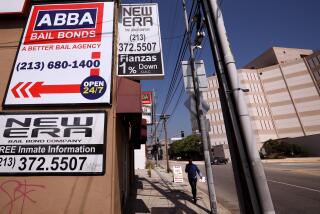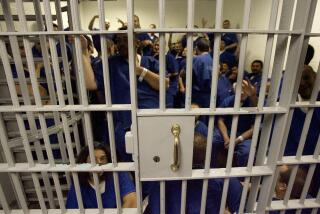Judge Refuses to Lower $5-Million Bail for Keating : Courts: Key figure in collapse of Lincoln Savings & Loan is deemed a flight risk and is assured of more jail time. Bail is lowered for three of his co-defendants.
LOS ANGELES — A Los Angeles judge Friday refused to reduce the $5-million bail for Charles H. Keating Jr., saying the Phoenix businessman is a flight risk after being indicted on 42 counts of state securities fraud and other violations.
Superior Court Judge Gary Klausner said Keating--pursued by creditors, regulators and prosecutors for his role in the failure of Irvine-based Lincoln Savings & Loan--has “significant reasons not to stay around.”
The ruling means that the 66-year-old Keating--a once-wealthy real estate developer, lawyer and influential political campaign contributor used to pin-striped suits--will spend more time in blue prison fatigues inside Los Angeles County Jail.
At the same time, Klausner reduced bail for three Keating co-defendants from the $1 million he imposed Tuesday when the indictment was unsealed against the former operators of American Continental Corp. and its former main subsidiary, Lincoln.
Bail for Judy J. Wischer, 42, former American Continental president, was lowered to $200,000. Bail for Robin S. Symes, 37, and Ray C. Fidel, 32, both former Lincoln presidents, was cut to $100,000. All three posted bail late Friday and were expected to be released during the night.
The four are charged with wrongdoing in the sale of more than $200 million in American Continental bonds to thousands of mostly elderly Southern California investors. The bonds were sold through Lincoln branches, allegedly as safe and insured investments.
The bonds became worthless when American Continental filed for bankruptcy in April, 1989. The next day Lincoln was declared insolvent and seized by federal regulators. The failure is expected to cost taxpayers $2 billion.
Stephen C. Neal, Keating’s attorney, indicated he would appeal Klausner’s ruling. Keating will not flee and intends to fight to clear his name, Neal said. But the decision denies Keating access to his attorneys and to records so he can mount a defense effectively, the lawyer said.
“We think (the decision) is unsupportable on the evidence that was introduced this week,” Neal said.
Keating had sought to have bail reduced to $500,000, an amount that could be paid by his family, Neal said.
Neal argued that Keating, who three years ago had a net worth of nearly $40 million, is broke. Keating’s former accountant testified that his debts exceed his assets by $5.2 million.
Los Angeles County Dist. Atty. Ira Reiner, whose office has flip-flopped twice in its bail recommendations in the case, praised the decision not to reduce Keating’s bail.
“Mr. Keating is accused of cheating people out of their savings,” Reiner said in a press conference after the hearing.
“For many of them, it was their life savings. And whether somebody wears an expensive suit or a cheap mask, stealing is stealing and both of them ought to be treated the same.”
The judge’s decision came after 1 1/2 days of testimony and arguments in the first criminal case to be filed in connection with the collapses of Lincoln and Phoenix-based American Continental.
Keating, unshaven and looking tired, sat impassively in the prisoners’ block as the judge announced his decision.
Afterwards, Donald Smaltz, attorney for Symes, criticized Reiner and Klausner for their handling of the bail hearing.
“The most talked about event in the last several weeks has been the Iraqi invasion,” Smaltz said. “The sole thing that replaced Saddam Hussein on the front page was Charles Keating, and Reiner’s milking that for all it’s worth.”
He also struck out at the judge, saying, “He’s never going to get arrested for flashing his Phi Beta Kappa key. Bail is supposed to assure a defendant’s appearance in court and must be within the means he could reasonably afford.”
Klausner also said he was “troubled” by the way the district attorney has equivocated on the bail issue.
On Tuesday, when the indictments were unsealed, prosecutors did not object to releasing all the defendants on their own recognizance. On Wednesday, prosecutors said they were willing to recommend a reduction in bail to $1 million for Keating and $50,000 for the others. Friday, Deputy Dist. Atty. Paul W. Turley argued against reducing the bail.
Reiner, who was appointed a special state prosecutor by Atty. Gen. John K. Van de Kamp to investigate Lincoln, said he was willing to let the defendants go without bail on Tuesday because he didn’t want to face a difficult battle extraditing Keating from Arizona.
After Klausner first ruled, Reiner said he then supported the bail set. But asked why his office changed his mind later, he said, “I’m not sure that I understand the semantic difference.”
While defense attorneys wouldn’t say what they thought of the prosecutor’s actions, other lawyers connected indirectly to the case scored Reiner for allegedly using the case and his changing views on Keating’s bail to bolster his public image.
Klausner said that of all the factors to be weighed in determining a proper bail, the seriousness of the alleged crimes and the risk of a defendant fleeing were the most important in this case.
Throughout the hearing, defense attorneys brought witnesses and other evidence to court to show that their clients were destitute or nearly so. They argued that the defendants would return to court for trial to fight for their vindication, as they had stayed to fight the massive civil litigation filed against them.
Keating and the others also have known they were targets of state and federal criminal investigations for a long time and would have fled the country by now if they had wanted to avoid prosecution, their attorneys said.
They also argued that the indictment contains no information about specific wrongdoing, alleging only violations of certain laws regarding the sale of American Continental debt securities at Lincoln offices to 20 people. The alleged crimes caused the victims to lose nearly $1.2 million, hardly serious enough to warrant such high bails, they contended.
But Turley contended that the 20 people represented a much bigger group of investors who lost much more money, throwing in a new figure in the often-changing number of total victims. He said 17,458 small investors had bought $250 million in American Continental bonds at Lincoln.
He reminded the court of “one major distinction” between this case and other thrift fraud cases. “The victims are individuals deprived of their own particular finances,” he said, not taxpayers asked to foot the bill for the entire thrift debacle, now estimated at $500 billion over the next 30 years.
Reiner said that, though his office had no evidence that Keating would flee, “you can’t escape the thought of Mr. Robert Vesco in a case like this.” Vesco, a New Jersey financier indicted in 1972 for allegedly defrauding four firms out of $224 million, fled the country and remains at large.
More to Read
Inside the business of entertainment
The Wide Shot brings you news, analysis and insights on everything from streaming wars to production — and what it all means for the future.
You may occasionally receive promotional content from the Los Angeles Times.










